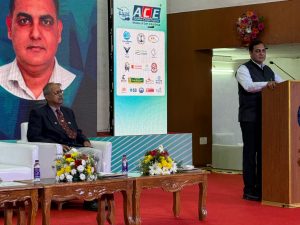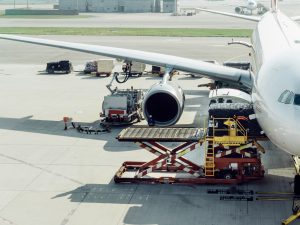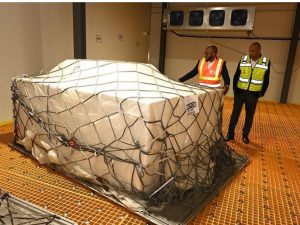Air Astana is continuing to rely on Jettainer’s expertise in Unit Load Device (ULD) management. This longstanding partnership between the global leader in ULD management services and Kazakhstan’s national airline, headquartered in Almaty, that began in 2007, has been renewed again on a long-term basis. Air Astana’s ULD needs will change in the coming years due to its planned fleet modernization with the introduction of Boeing 787 aircraft. Jettainer will continue to partner closely with the airline as it takes this step and supports it with customized solutions. Air Astana is focusing on growth. The Kazakh airline plans to increase its fleet from 60 to 80 aircraft, including Boeing 787 Dreamliners, by the end of 2028. The planned fleet change will result in a growing and diversified ULD fleet. Jettainer will provide comprehensive support and expertise during the transition. By working with Jettainer, Air Astana will not only benefit from a dedicated ULD fleet but also from efficient ULD management. This will ensure smooth operations and contribute to seamless tracking and monitoring of ULD movements, leaving Air Astana to focus fully on its core business. Berik Abdrakhmanov, Director Ground Services at Air Astana, commented, “We have been working very well and closely with Jettainer for more than 18 years. We are confident that Jettainer’s team of experts will continue to help us achieve our growth plans with the innovative and customized ULD services we need to make them happen.”
Read More »Industry meet to discuss global air cargo issues & trade
The National Symposium which took place on 27 March 2025, focusing on the role of air cargo in modern logistics and global trade. The two day programme was inaugurated by Neeraj Kumar, Director (International Regulations and Legal Affairs), DGCA. He provided valuable insights into air cargo logistics operations in India. The session was presided over by Dr. Malini V. Shankar, IAS (Retd.), Hon’ble Vice-Chancellor, IMU, along with the esteemed presence of RAdm (Dr) P J Rangachari (Retd.), Director, IMU Chennai Campus. The panel discussion focused on air cargo, a vital sector in global trade. This session featured industry experts who shared valuable insights into the air cargo industry’s challenges, trends, and innovations. It offered students a unique opportunity to interact with seasoned professionals, gain knowledge about global logistics, and understand the evolving dynamics of air transportation providing an enriching experience for anyone interested in logistics, business, or transportation. The keynote address was delivered by Tulsi Mirchandaney, Managing Director (Retd.), Blue Dart Aviation Ltd., Chennai, who discussed the growth of the air cargo sector, its impact on global supply chains, and the role of technology in driving efficiency and sustainability. Panel Discussion focused on Optimising Global Supply Chains – The Integral Role of Air Cargo in Modern Logistics. These luminaries from the industry covered gamut of topics, such as innovations in air cargo logistics and strategies for improving supply chain efficiency, infrastructure development and investment in air cargo handling facilities, application of AI and data analytics in air cargo operations, the precautions to be taken while transporting hazardous materials, the integrative role of air cargo transportation in the global supply chain management, etc.
Read More »IATA promotes SAF Registry plans
IATA is continuing to develop plans for its Sustainable Aviation Fuel (SAF) Registry to support air cargo companies and other aviation stakeholders in their decarbonisation efforts. IATA has established the Civil Aviation Decarbonization Organization (CADO) to manage its SAF Registry when it is released. CADO is incorporated as a not-for-profit organisation in Canada with its headquarters in Montreal. IATA is the founding member of CADO and its role in CADO will include ongoing technical support and operations. CADO membership is open to organisations that operate in or contribute directly to the SAF value chain, or that represent any association or group of participants in the SAF value chain; states or quasi-state organisations with a direct interest in the operations and benefit of the SAF Registry; and related interest groups indirectly benefitting from SAF deployed in the aviation system.
Read More »Global air freight rates surges, despite mixed outlook: TAC Index
According to the latest data from TAC Index, global air freight rates have increased despite mixed outlook for trade and markets. The global Baltic Air Freight Index (BAI00) calculated by TAC was up another +2.3 per cent YoY over the week to March 24, leaving it ahead by +3.5 per cent YoY over the past 12 months, states report. Rates out of China were higher again last week on lanes both to Europe and to North America, leaving them still close to levels of 12 months ago. The index of outbound routes from Hong Kong (BAI30) was narrowly lower by -0.1% WoW, but still ahead by +3.1% YoY, with sources suggesting that spot rates had continued to rise. Outbound Shanghai (BAI80) was up a further +6.2% WoW – leaving it up by similar +3.4% YoY. Elsewhere from Asia trends in rates continued to be more mixed – with falls on lanes to Europe from Vietnam, Bangkok and Seoul, and falls this time too on lanes from India both to Europe and the US. By contrast, rates from Vietnam to the US continued to increase. From Europe, rates were generally falling last week, including on lanes to China and Japan as well as to the US. However, the index of outbound routes from Frankfurt (BAI20) bounced back from recent falls with a gain of +9.5% WoW, boosted by gains on most major lanes, pushing that index back into positive territory at +10.3% YoY. By contrast, outbound London Heathrow (BAI40) fell back again after a surge the previous week, a drop of -15.6% WoW pulling it down to -8.7% YoY. Out of the Americas, the index of outbound routes from Chicago (BAI50) gained +5.8% WoW, led by higher rates on lanes to South East Asia to leave it at +12.7% YoY. Overall rates of the US were generally higher on lanes …
Read More »‘Empowering MSMEs must to achieve Viksit Bharat 2047 vision’
“MSMEs form the backbone of India’s economy, and a strong logistics network is vital to their success. We empower MSMEs with efficient, sustainable, and technology-driven logistics solutions, ensuring seamless market access,” said, Kaushal Shetty, Head of Marketing & Transformation, Allcargo Gati. He added, “Through providing the same tools available to larger businesses, and capacity-building, we enable them to scale operations, enhance competitiveness, and contribute to India’s vision of Viksit Bharat.”
Read More »Caribbean Cargo opens cold storage facility to boost seafood exports
Caribbean Airlines Cargo has opened a new cold storage facility at its home hub at Piarco International Airport in Trinidad to cater for seafood shipments, and enhance global operations. The new facility opened on 20 March and offers 5,000 sq ft of storage to handle temperature-sensitive export cargo. “It is the first of its kind within the Piarco aerodrome and English-speaking Caribbean,” the airline said. “This new unit adds immense value to many of the airline’s perishable-goods cargo customers, many of whom are local fish exporters.” The facility was equipped with a roller system and was built to accommodate the easy loading and storage of up to 40 aircraft pallets. It also features “optimal, refrigerated temperature control” to a minimum of 2 degrees Celsius. “At Caribbean Airlines Cargo, we reaffirm our dedication to continuous innovation and service excellence, and this facility was constructed to preserve the integrity of our customers’ shipments and provide them with enhanced reliability in their logistics chain,” said general manager, Marklan Moseley.
Read More »FedEx plans to expand fleet, orders eight B777Fs
FedEx has announced the order of eight Boeing 777 freighters and 10 ATR 72-600 turboprops as third-quarter profits and revenues both improved. In an investor release, the company said that in March 2025 it had exercised options to purchase an additional eight 777F aircraft as part of its fleet modernisation programme. Three of the aircraft are expected to be delivered in 2026 and the remaining five in 2027. It also agreed to purchase a further two of the model earlier in the quarter. Meanwhile, the company said it would also extend the retirement of the entire Boeing MD-11 fleet from 2028 to the end of 2032. It had been gradually phasing out the aircraft to replace them with more fuel-efficient models, such as the 777F. In total, FedEx currently operates 57 777 freighters and has a further 11 on order, including the 10 mentioned above. Its MD-11F stands at 37 aircraft.
Read More »Thales opens avionics MRO facility near Delhi Airport
Thales opened its new avionics MRO facility in Gurugram, near IGI airport. Aligned with the vision of “Aatmanirbhar Bharat” (‘self-reliant India’), this centre will provide a wide range of services, including the maintenance & repair of avionics components, to prominent Indian airlines such as Air India and IndiGo. This new repair hub draws on Thales’s expertise as a global leader in the aerospace industry, providing premium support and services to airline customers in India. The inauguration was held in the presence of the Honourable Minister of Civil Aviation Shri Kinjarapu Rammohan Naidu. The event was graced by Mr. Damien Syed, Deputy Head of Mission, Embassy of France in India, along with senior Government officials and eminent dignitaries from the French Embassy and the industry. The Thales team was led by Yannick Assouad, Executive Vice President, Avionics, Thomas Got, Vice President, Aviation Global Services and Gilles Bono, Vice President, India. This occasion marks a milestone in Thales’s continued investment strategy in India’s rapidly expanding aviation market. Shri Kinjarapu Rammohan Naidu, Honourable Minister of Civil Aviation, Government of India said, “My heartfelt appreciation goes to Thales for setting up this dedicated facility in India to provide onshore MRO services to our airlines. Taking a tour of the facility and seeing it firsthand, I must say that I am deeply impressed by the meticulous planning and innovation that have gone into creating this centre. I believe the inauguration of this advanced avionics MRO centre marks a significant milestone for Indian aviation and a proud moment for Thales in India. This facility exemplifies our collective commitment to building a self-reliant India and a self-reliant aviation ecosystem under the visionary leadership of Hon’ble …
Read More »‘Limited capacity, infrastructure, high costs & delays lead to congestion at terminals’
Rajen Bhatia, Director, Tulsidas Khimji said, “Congestion at airports, especially during peak hours, is a significant issue affecting the efficiency of air travel and cargo movement, limited infrastructure and operational bottlenecks contributes to delays, high transit times and increased costs. There are various factors that affect the trade like limited Capacity, high Transit Times and Delays, Increased Costs, Environmental Impact. The Impact on Global Trade and Business: • Uncertainty in Delivery Times: Congestion at airports makes it difficult to guarantee delivery times, which is crucial for industries that rely on fast, predictable logistics. • Global Supply Chain Disruptions: Delays at major international airports affect the global supply chain, potentially impacting businesses’ ability to meet demand, especially in industries like e-commerce, automotive, and manufacturing. Congestion at airports is a complex issue that involves not just the transportation of passengers but also the smooth movement of cargo. It has far-reaching impacts on costs, efficiency, aenvironmental sustainability and supply chain inefficiencies that hurt businesses and disrupt the flow of goods, particularly in critical, fast-paced markets like Mumbai.
Read More »‘ AFS can decongest terminals, enhance efficiency, and expedite clearance procedures’
Vipin Vohra, Chairman, Continental Carriers said, “Congestion at airports, especially during peak hours, significantly impacts cargo movement, leading to delays, higher transit times, and increased costs. A viable solution is the development of off-airport locations such as Air Freight Stations (AFS) near airports. By shifting cargo processing activities away from the airport premises, AFS can decongest terminals, enhance efficiency, and expedite clearance procedures. To encourage wider adoption, authorities should incentivise AFS development through policy support, streamlined regulatory frameworks, and operational benefits. A structured approach integrating AFS into India’s air cargo ecosystem will optimize logistics, reduce costs, and ensure seamless trade facilitation.”
Read More » Cargo Breaking News
Cargo Breaking News









